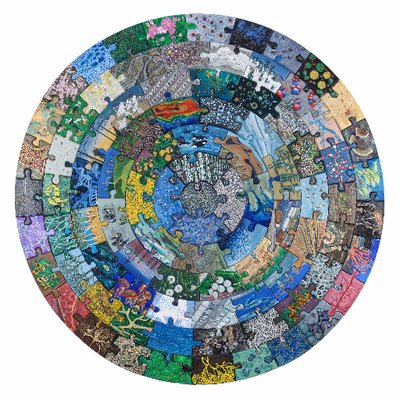
Art By, Richelle Gribble
I search and I scan for the perfect metaphor
Abhorring imprecision or worse selling out
To the exigencies of a concocted cocktail
A ballerina poising on a sharpened pinkie
The tone of skin, voice or deafness.
What can one say of no-thingness
Without being led into a perjury trap
Ayin or Ayn (in Hebrew) mean the same,
Carving out a no-thingness if
Understood is no-thing unto itself.
To be Ayin is to open to it all
No-thing contrasted to a
Something that is separate.
Go to a stream or the Amazon
And scoop out a bucket full
Bring it to class and proclaim
Behold the mighty Amazon
Classmates will prime the breaks
Question what you present
A conceptual miss, the thing-water
Appearing as a separate form,
Not flowing downstream
To a fabled City of Gold.
Leonard Cohen:
“If you are going to destroy
Versions of yourself that
Provide too easy a solution,
You have to murder those
false persons who whisper
untruths about things.
I prefer letting go
To words of annihilation
The awareness of no-thingness
To see the illusiveness of thingness
Separateness is thought of
Interconnectedness experienced.”
At the last day of school their names were selected—recipients of goldfish each in a small, water filled plastic bag. Off to the store for a tank, a filter and colored gravel. One twin is assigned the morning and the other twin the evening feeding. They live in their domain and we live in ours.
In God Creates a Whale it pops into God’s mind one day, “Time for a pet?” But where to put the whale so that it can exist? Eventually an entire universe is necessary to house but a single whale. And then, so the whale can propagate, it needs a Thing Two to its Thing One and a much larger tank and gravity. It gets complicated.
The tenth awareness of Kabbalah Experience is to see our existence as a flow in time and space, as an interconnected push me-pull you. There is no something in and of itself—there is always correspondence, interdependence, entanglement and the constant shifting of being. That is what is meant by the improvisational “going with the flow.”









1 Comment
Anita Khaldy Kehmeier · November 20, 2018 at 12:06 pm
There’s a Cost to Wandering
‘Blaze’ is a challenging alternative to familiar rags-to-riches tales.
By Gareth Higgins December 2018
Print
‘Blaze’ is the story of Texan movie star Blaze Foley, played by Ben Dickey, and his wife Sybil, played by Alia Shawkat.
IN THE FILM BLAZE, directed by actor Ethan Hawke, happiness is rare and meaning always seems slightly out of reach, just around the corner. An unconventional, compelling biopic of Blaze Foley, a country musician who died too young, and violently, Blaze is a challenging alternative to familiar rags-to-riches tales. It’s rags-to-slightly-more-fashionable-rags, where the loneliness of the road is never salved by the acclaim of a crowd, the price of art being the very life of the artist.
As a movie about the pain of making music, it’s up there with Tender Mercies, Coal Miner’s Daughter, and Dreamgirls. As a biopic it gets closer to the inner life of its subject than most—Ben Dickey’s hypnotic lead performance embodies the drive to write, to sing, to perform, even if no one’s watching. “He knew the value of zero,” says iconic songwriter Townes van Zandt in the film. Van Zandt is played by Charlie Sexton, one of van Zandt’s cultural heirs and a frequent member of Bob Dylan’s band. The value of zero here is the notion that what we’re most called to in life is authenticity, whatever the reward.